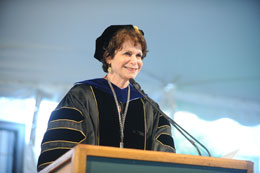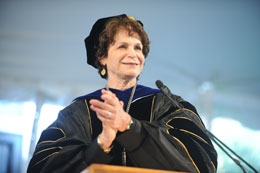 On behalf of the Trustees, faculty, and staff of Sarah Lawrence College, I am delighted to welcome you to the Commencement of the class of 2013. To the graduating class, let me say that we all have taken great pleasure in witnessing in you the "transformative" effect that Sarah Lawrence alumni identify as the legacy of their educations.
On behalf of the Trustees, faculty, and staff of Sarah Lawrence College, I am delighted to welcome you to the Commencement of the class of 2013. To the graduating class, let me say that we all have taken great pleasure in witnessing in you the "transformative" effect that Sarah Lawrence alumni identify as the legacy of their educations.
Along with our graduates, today we honor the family members in the audience, particularly the parents, whose love and commitment have supported our students. Ben Jonson, the seventeenth-century poet and playwright, called his child his "best piece of poetry." To the parents here today, I want to tell you that over your son's or daughter's college career, we have done everything in our power to nurture the development of these precious products of your creativity and love. Members of the Class of 2013, would you please stand and recognize the family members and friends who have made this moment possible?
I have attended commencements at other institutions, but I have never seen anything like the rousing response of the graduates when their teachers and dons proceed down the aisles at Commencement. The artisanal nature of both teaching and learning at Sarah Lawrence leads to a student-faculty relationship that is unparalleled. Crafted by teacher and student together, the singular education this College offers depends on faculty who understand that people learn in different ways and at different tempos and that there is no one path to becoming an educated person. This past year, national publications caught up with what the Sarah Lawrence community has recognized for decades: that we have the most committed and best teachers within the landscape of American higher education today.
I have used several phrases to describe the Sarah Lawrence difference—"singular education," a term that attempts to capture both our focus on the individual and our distinctiveness; "artisanal," which refers to the non-assembly line approach we take to teaching and learning; and "transformative." Given the current climate of skepticism about the value of education—and liberal arts colleges in particular—it is imperative for us to find the right words, stories, images, and examples to convey the way in which the education Sarah Lawrence offers is different from other colleges, and how it matters in the lives of our students and the work they go on to do in the world.
But images and stories may not be enough. We must take on directly this discourse of skepticism that hinges on two kinds of questions: One is a new version of an old complaint—it asks if a liberal arts college is an ivory tower, detached from "the real world" and insufficiently preparing its graduates for careers. In the popular press and even the Chronicle of Higher Education, this question is increasingly translated into an economic register: does this kind of education provide a good enough return on investment?
The second question is also based on economics, but from a different angle. Ironically, this question asks it if a liberal arts education—wedded to the concepts of physical space and presence—is too focused on the "real" world and could be more efficiently replaced by online learning and virtual reality.
I'd like to address these questions not because economic terms are sufficient to capture the value of a Sarah Lawrence education, but because they are necessary to confront. The fact is that with rising student debt and decreasing family income, as well as the struggle of liberal arts colleges to sustain their models, no college can afford to ignore economic questions, even as they too narrowly commodify the education we provide.
We who teach in liberal arts colleges have always maintained that what we teach—critical thinking, communication, the ability to question, are durable skills for a lifetime. I believe this. But I want to move past these generic aspects of a liberal arts education to the more specific and distinctive principles of progressive education, the ones on which Sarah Lawrence was founded. Because the fact is that they are more relevant now than ever. What strikes me in the calls for educational reform in the 21st century is this: though they rarely mention the progressive model of education, they implicitly recognize that this model—our model—is the key to preparing students for the 21st century world.
Estimates predict that over 65% of the jobs that will be available upon college graduation for students now entering high school do not even exist at this time. Recently in an op ed in The New York Times, called "Need a Job? Invent It," (March 30, 2013), Thomas Friedman calls for educational reform so that graduates can be better prepared to invent their own careers, as traditional ones disappear. Friedman says, "Reimagining schools for the 21st century must be our highest priority. We need to focus more on teaching the skill and will to learn and to make a difference and bring the three most powerful ingredients of intrinsic motivation into the classroom: play, passion, and purpose." We are masters of developing intrinsic motivation. The progressive education founded by John Dewey never accepted the premise of learning as separate from practical engagement or purpose, or theory as separate from practice. Friedman's words echo Dewey's more than a century ago. Dewey wrote: "I believe that much of present education fails because…it conceives the school as a place where certain information is to be given, where certain lessons are to be learned, or where certain habits are to be formed." Instead, learning through active inquiry, learning HOW to learn what you need to know is both the most practical—and the most valuable—capacity of all.
 This is precisely why our alumni, in disproportionate numbers, create things in spaces where they did not exist before. There is no one who exemplifies this more than our commencement speaker, Vera Wang, who, needing a dress for her own wedding, transformed an entire industry. Nowadays, creating new spaces increasingly does include the virtual spaces of the Internet. For example, in our new entrepreneurial SLCeeds program, designed to help students develop their ideas for solving problems or meeting unmet needs, many brought passion, play, and purpose online.
This is precisely why our alumni, in disproportionate numbers, create things in spaces where they did not exist before. There is no one who exemplifies this more than our commencement speaker, Vera Wang, who, needing a dress for her own wedding, transformed an entire industry. Nowadays, creating new spaces increasingly does include the virtual spaces of the Internet. For example, in our new entrepreneurial SLCeeds program, designed to help students develop their ideas for solving problems or meeting unmet needs, many brought passion, play, and purpose online.
To be true to its roots, progressive education cannot be complacent about what it takes to be progressive today. Students are entering college with different skills and expectations, many of them with a technological literacy that structures their social—and even their academic—relations. We have a responsibility to think creatively about how this matters and how our own educational practice incorporates it. And we can showcase the relevance of Sarah Lawrence's educational philosophy by embracing our own leadership role. Indeed, this year, the Child Development Institute hosted a very successful national conference on the future of progressive education.
In order to help students better translate their critical abilities into work and service in the world, this forward thinking has led to new initiatives, like SLCeeds or our new educational partnership with the Hudson River Valley Environmental Education Institute in Yonkers to enhance science and science education at the College and in the community. These initiatives reinforce the importance of a humanistic education that depends upon the "real world" interaction of people learning and working together in one place.
Because the fact is that there is no substitute for the transformations you have undergone together—in this space, during these years at Sarah Lawrence. When the power went out—first with Irene and then with Sandy—the community took care of each other. We know that a Sarah Lawrence education goes way beyond preparation for careers; it provides what Kenneth Burke called "equipment for living." And that's the real problem with commoditizing the return on investment of an education like ours. It misses the magic, the passion, and the lasting effects of your experiences at Sarah Lawrence on your lives and the lives of others. In emphasizing education as economic transaction, it ignores the pixie dust that you will spread through the world as you make your way.
Class of 2013, we wish you the best as you continue the creative work that you have begun here. We expect nothing less of you than to change for the better your communities, your workplaces, your relationships, your nations, and your world.
Congratulations. We salute you.